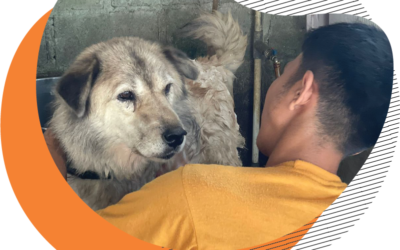
ANIMAL WELFARE PERSPECTIVE FROM ASIA TO THE WEST
By : Reygildo
Translator : Tim AWI
Animal rights and welfare have long been integrated with animal issues. The ideas of animal rights and animal welfare came into being mostly via the efforts of Western nations. A paradigm shift was initiated, at least in the 19th century, by Jeremy Bentham and John Stuart Mill, who contended that while animals are rational and do not have thoughts, they are relevantly similar to humans since they have feelings
The utilitarians then went on to defend the equality concept. But because it places more value on morality than on sentiments, the utilitarian viewpoint is thought to have flaws. Thus, there is a belief that killing animals is morally acceptable. The conversation around animal rights and welfare is still evolving.
In his book A Theory of Justice for Animals, Robert Garner argues that since the fundamental right of animals is the freedom from suffering, anything that subject them to distress is an infringement on their rights.
Nevertheless, he added that animals’ rights may be given up in exchange for a sustainable way of life, if the animal suffered no harm in the process.

Movements come from this idea. Nelkin and Jesper in The Animal Rights Crusade. explains the 1980s animal rights and welfare movement that took place in Manhattan. Protesters against the use of rabbits in cosmetic studies blocked the walkway in front of the Revlon headquarters through a flatbed truck loaded with bunnies. The use of chemicals on rabbits’ eyes to see whether they produced redness, swelling, or something else incensed demonstrators.

Western thought is where the ideas of animal welfare and rights first appeared.
The idea of animal welfare has become more widely accepted because to Western concepts. That being said, is it true that Asian nations have no viewpoint at all on animal welfare?
Image: U-Report
The book Asian Perspectives on Animal Ethics by Dalal & Taylor is the one I want to mention. Religious aspects like Buddhism, Hinduism, and Jainism are explained as having intimate ties to South Asia in the
book.
Individuals there think that after they die, they will reincarnate. Both their good and poor life karma have an impact on this process. An animal or plant’s rebirth will be lower the worse their karma was. Harming living beings—humans and animals alike—is one way to accrue bad karma.
Eventually, people from South Asia who follow a vegetarian diet and abstain from animal cruelty are also impacted by this.
Through cultural perspectives, East Asia gained influence. Based on their grouping, they developed a classification system for animals.
Firstly, wood and scaly animals are the same. Secondly, hairy creatures are often associated with fire. Third, animals with no skin are the same as the earth. 4. Haired creatures are the same as metal.
East Asian society treats humans equally with other animals in this class. The fact that humans fall under the group of animals without skin serves as a reflection of this.
Image: JAAN Domestic Shelter

We can see how Asian and Western nations have different perspectives on animal rights and welfare from the little description provided above. Due to inherited cultural practices and beliefs, Asian nations have come to realise the importance of animal care.
While the debate over animal welfare in this instance is still confined to the private sphere, Western intellectuals were the first to introduce the idea into the public sphere, leading to the eventual emergence of animal protection movements and the gradual global dissemination of this concept.
Source :
Dalal, Neil & Chloe Taylor. (2014). Asian Perspectives on Animal Ethics. Rotledge Taylor & Francis Group.
Garner, R. (2913). A Theory of Justice for Animals : Animal Rights in Nonideal World. Oxford University Press.
Jasper, M James & Dorothy Nelkin (1992). The Animal Rights Crusade. The Free Press
RELATED POST :
Dog Cognition
By: Isabelle-Angelina SchosserNew study shows that Dogs are even more complex than we thought. What does this mean, if I want a to adopt a dog?Dogs are among the smartest animals on this planet. Over the course of thousands of years: the earliest findings in dog-human...
The Cassava Farm Boy Now Has a “Furever Loving Home”
The Cassava Farm Boy Now Has a “Furever Loving Home”. His face was pitiful, and his eyes were full of sadness. The brownish-white puppy was standing next to the wall of a dull house in a cassava plantation area in Karadenan, Bogor Regency. Every day, he observes people walking on the path in front of the garden. When a motor vehicle passed by,
he immediately ran away to hide in the bushes. When night fell, he could only huddle behind the wall in the dark and had to resist the invasion of mosquitoes in the garden.
I don’t know who would have the heart to throw that innocent little soul into a cassava garden.
One Health, One Welfare
Two significant movements that support one another are One Health and One Welfare. The objectives of both movements are the same:
to enhance human welfare by acknowledging the connection that already exists between people, animals, and the environment.
Because of their interdependence and connectivity, humans, animals, and the environment are intertwined.
HOW TO TRAVELING WITH YOUR PET
As a pet owner it is always a dream to travel with our pet wherever we go.To travel overseas
or just domestic ,far or near is always a risk to the animal. Not every pet has the means to travel, interact with people, or see new places. As pet owners, it is our responsibility to be aware of anything that could worry our animals before, during, or after a trip. If your pet is the really shy type and gets anxious easily in new situations, you may need to consider leaving them at home. Being well-prepared is essential for a happy trip with your dogs.
Read Aloud: Simple Enrichment for Dogs in Shelters
Read Aloud: SimpleEnrichment for Dogsin Shelters Reading aloud to dogs is one of the ongoing programs developed by The Animal Refuge League of Greater Portland. This activity is called Read and Relax, where the volunteers wouldread a book to dogs. By: Drh.Mikeu...
Caring for pets can help to improve mental health
Having a pet has many benefits. Related to World Mental Health week, Animal Welfare Indonesia summarizes various benefits from pet caring for mental health. By: Drh.Mikeu Paujiah, Dipl.Montessori Increase the feeling of wanted and needed. Pets can give a sense of...





